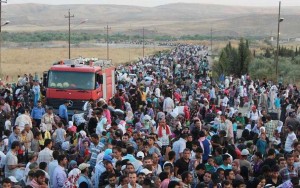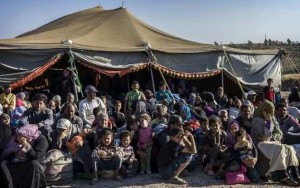
As the flow of Syrian refugees continues unabated, the very serious question persists of whether or not to admit them into the United States. Now, in the wake of the horrifying attacks in Paris, this matter has become much more urgent and emotional. The revelation that one of the attackers apparently had come to France under the guise of being a refugee has exacerbated the already heightened the anxiety concerning Syrian refugees here in the United States and throughout much of Europe.
The fear of many Americans that the United States may be admitting terrorists is impacting the presidential campaign.
On Nov. 19, Hillary Clinton addressed the Council on Foreign Relations. In addition to providing her strategy for dealing with ISIS, she made the case that the U.S. should continue to allow war refugees to enter the United States. The argument is simply that we are the United States and we must continue behaving in accordance with our historic values. By refusing to accept the refugees, we betray what America has always stood for. This is generally the position of the Democratic Party, as if paraphrasing Emma Lazarus’ sonnet inscribed on the Statue of Liberty: “Give me your tired, your poor, your huddled masses yearning to breathe free, the wretched refuse of your teeming shore. Send these, the homeless, tempest-tossed to me, I lift my lamp beside the golden door!”
It is hard to argue against this guiding principle, particularly as Jewish Americans, since our people have been the beneficiaries of American largesse, both at the turn of the 20th century and again at the end of World War II, when many of survivors of the Holocaust began their lives anew in this great country that welcomed them with compassion and open arms.
Still, on the other side, the Republican Party and its field of presidential candidates would have the United States slam the door shut, at least for now. Appealing to understandable widespread fear that the terrorists will soon attack here, compounded with the still haunting memory of 9/11, the Republican Party is largely unified in its insistence to bar the refugees, at least for now.

Currently 27 states have stated that they do not intend to admit Syrian refugees, although the legal basis for this is dubious. Most unfortunate of all is the suggestion by some that only Christian refugees should be admitted, not Muslims. I would like to believe that those who advocate closing the doors are motivated by true security concerns rather than xenophobia, but I am not so sure. It would be especially unfortunate if the presidential campaign would be determined by appealing to paranoia.
Of interest is the fact that both the Catholic Church and various Evangelical Christian groups have called upon the U.S. to keep it doors open to the refugees. The Religious Action Center of the Union for Reform Judaism has also expressed the same position.
To some degree, both sides are right.
The conflict with radical Islam is cause for extraordinary caution. And yet, if we are to become “fortress America,” we will be undermining be our own values by turning our back on such obvious human suffering.
And so, I offer this modest proposal. Let us set up temporary homes for the displaced persons who could reside there until they have been completely vetted and then admitted to American society. This would be following the example of the U.S. and its European allies at the end of World War II. Camps were set up for displaced persons.
The DP camps were temporary facilities primarily for refugees from Eastern Europe and for the former inmates of the Nazi German concentration camps. Two years after the end of World War II in Europe, some 850,000 people lived in DP camps across Europe, among them Armenians, Poles, Latvians, Lithuanians,Estonians, Yugoslavs, Jews, Greeks, Russians, Ukrainians and Czechoslovaks.
In recent times, camps have existed in many parts of the world for groups of displaced people including for refugees in the Darfur region of Sudan, and for Palestinians in Lebanon and Jordan, as well as for Afghanistan refugees in Pakistan. Such camps are now generally known as refugee camps. They need not be tent cities.
Here in America, we are well equipped to create such temporary homes, allowing the refugees to live securely and with dignity. They can begin learning to speak English and to become acquainted with life in America. Let the faith-based communities devote their resources to making life as comfortable as possible for the refugees. This is what happened in the aftermath of the Vietnam War, when thousands of “boat people” sought asylum in America. Many religious groups assisted in their resettlement.
After a thorough process is concluded, if they so desire, the Syrian refugees should be given every opportunity to make a new life here. Until then, they will be safe and America’s time-honored values will remain intact.
